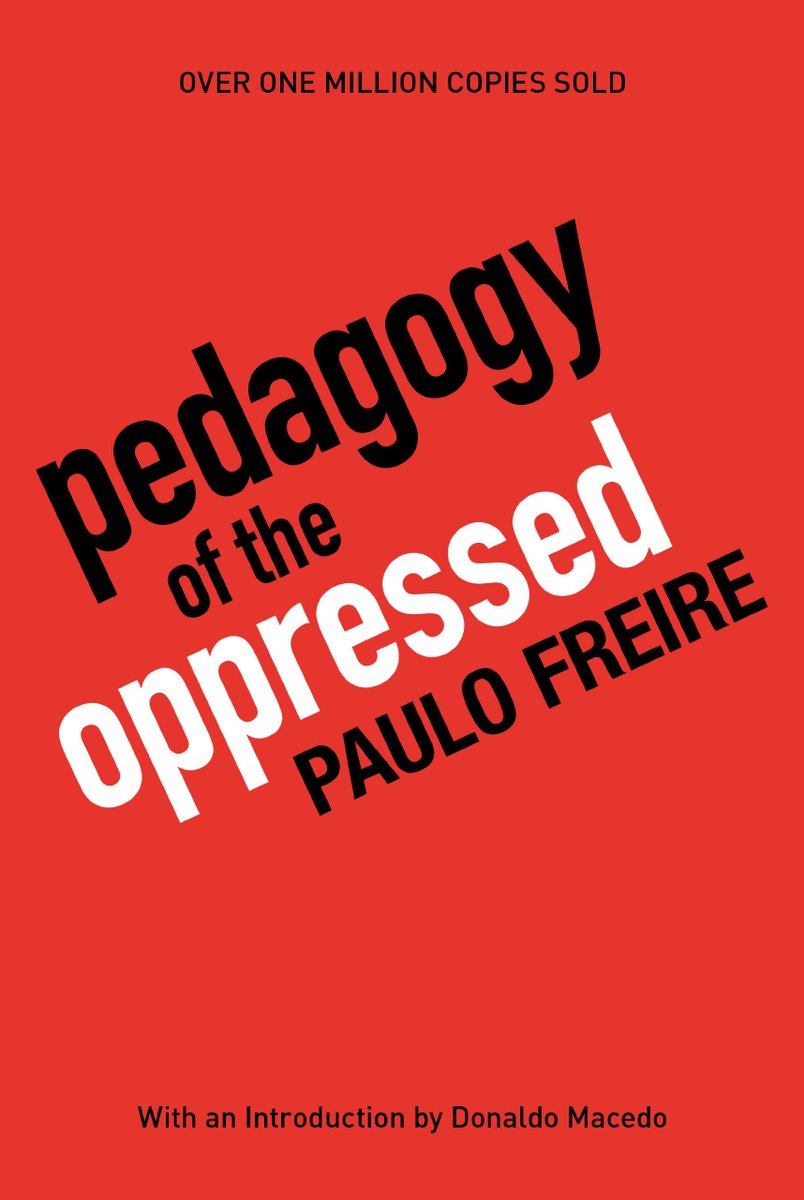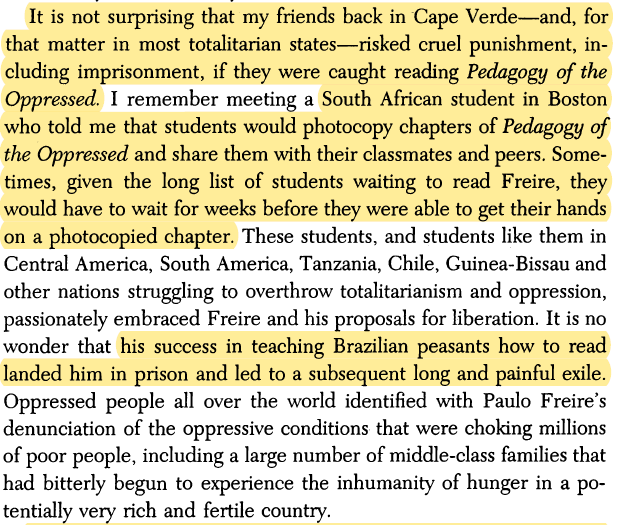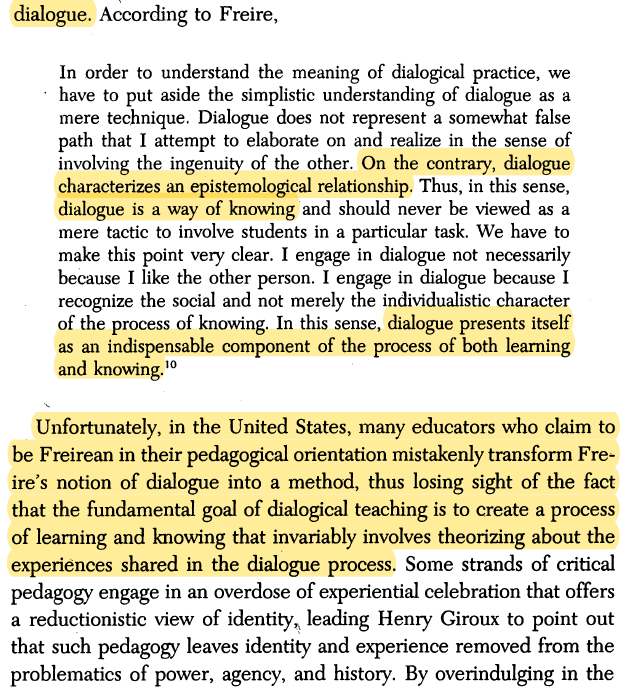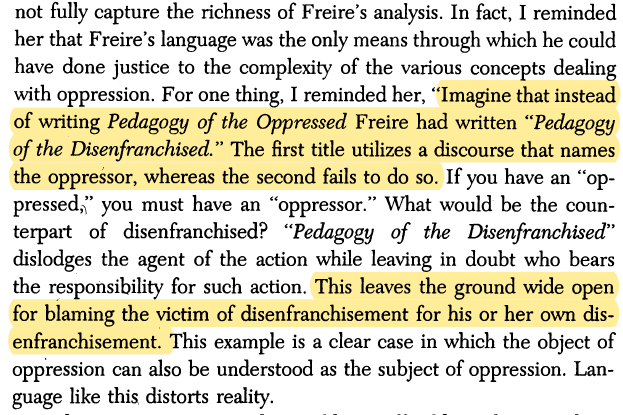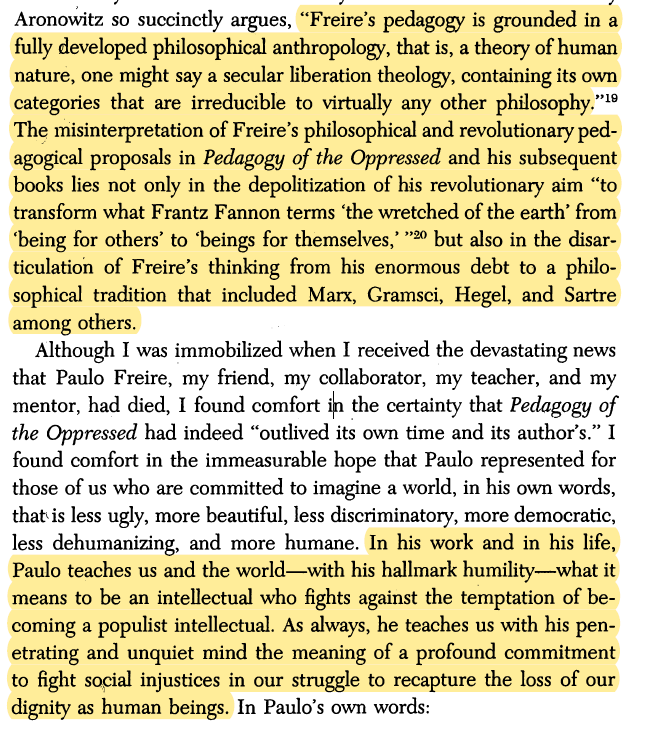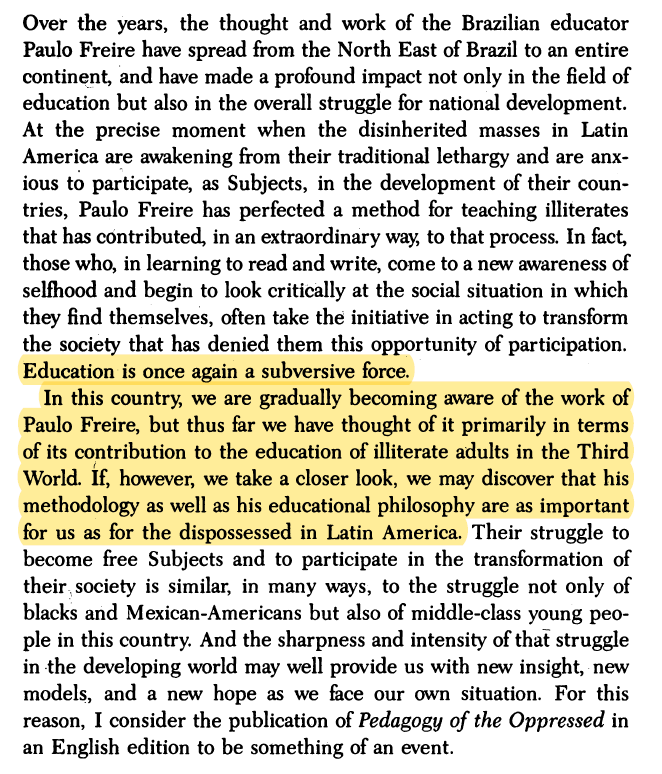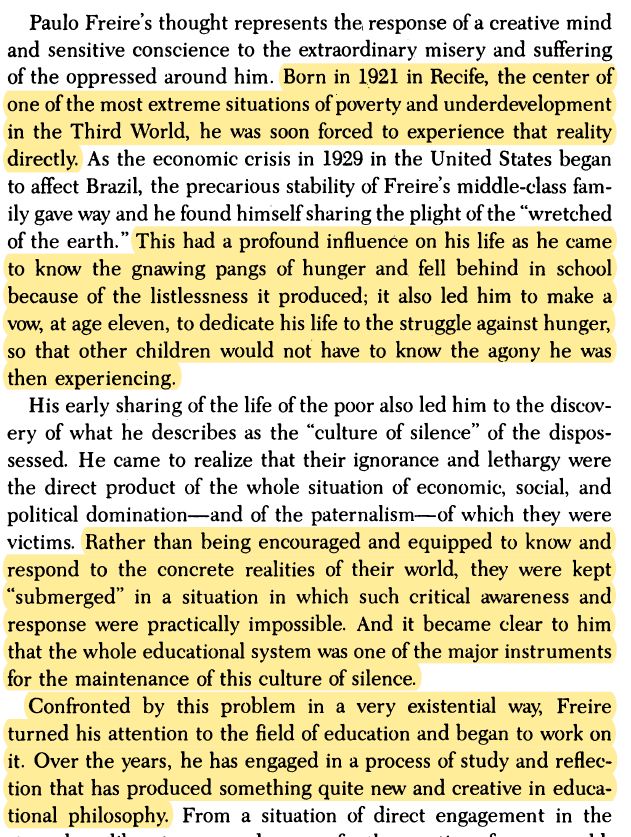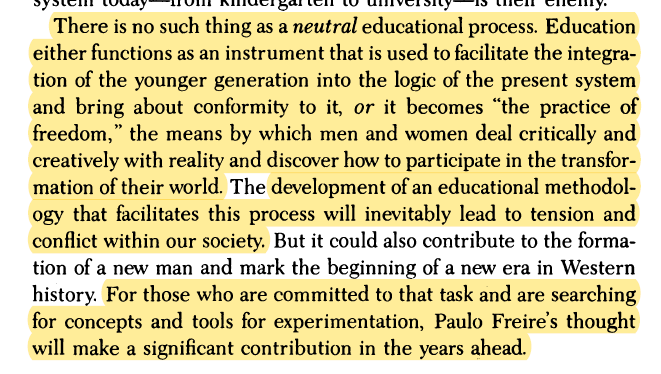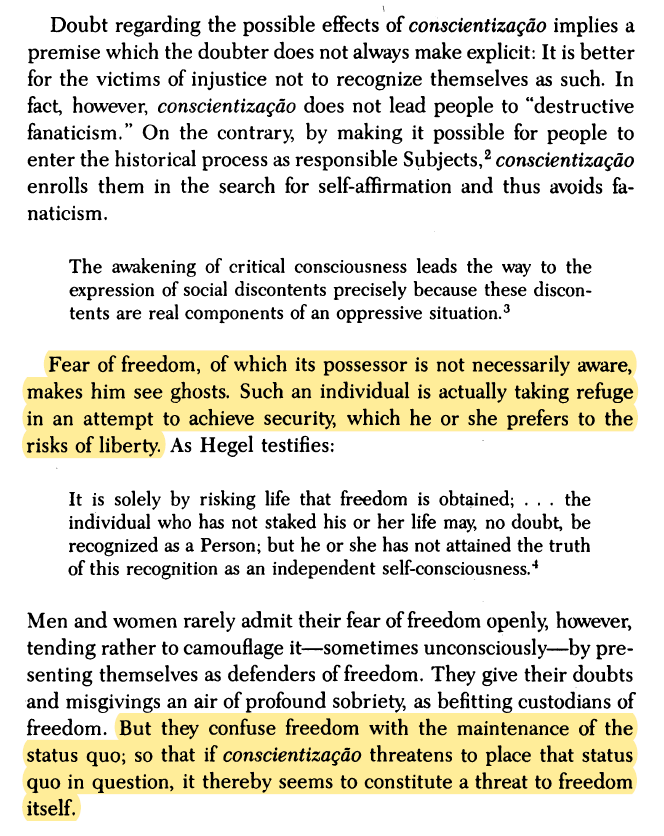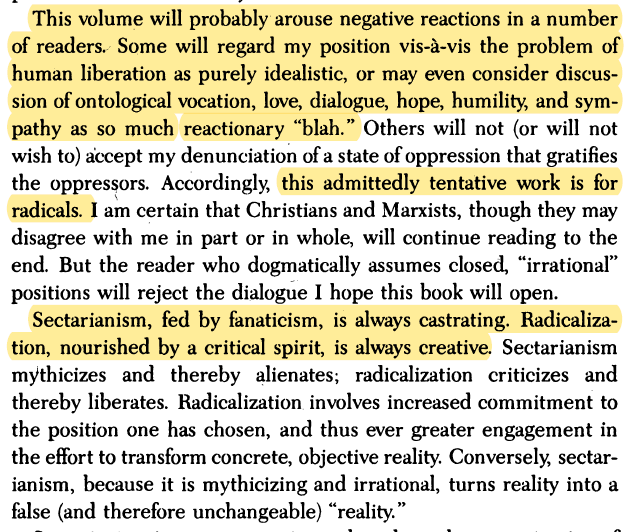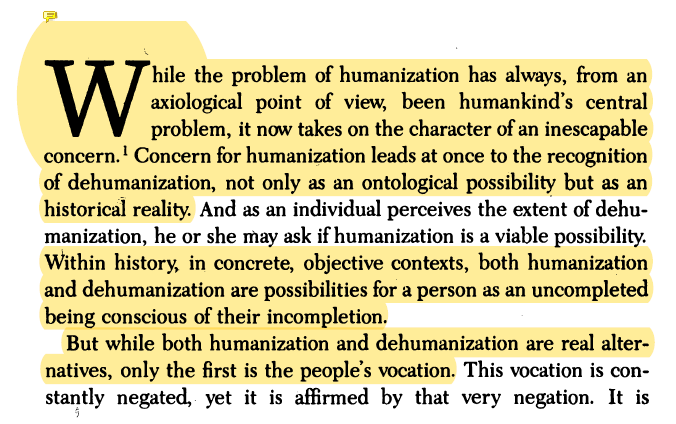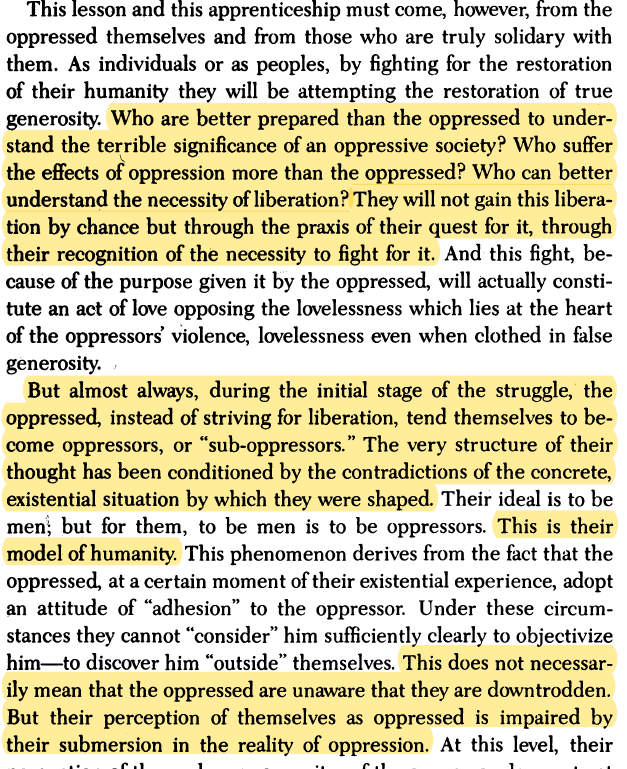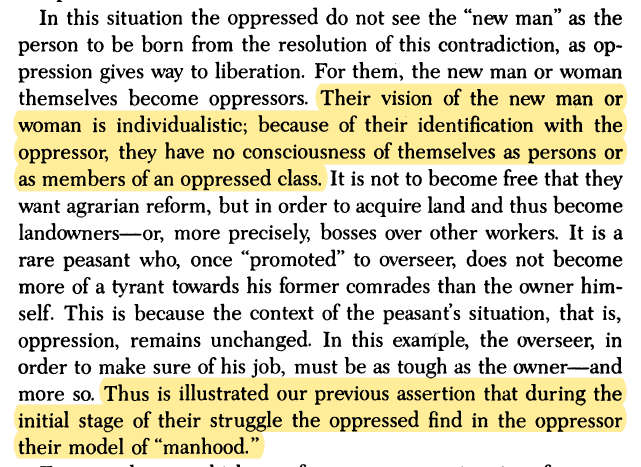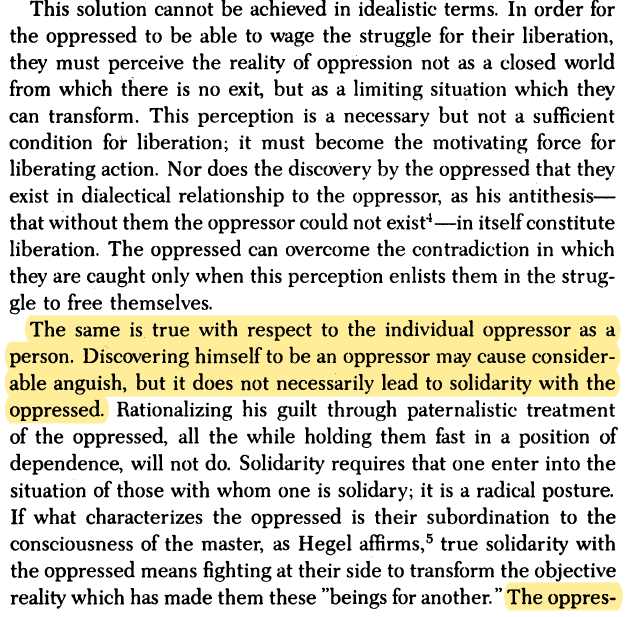Introduction by Donaldo Macedo
(Some context: the book was first written in Portuguese in 1968 and translated and published in English in 1970 and this introduction was written by Macedo in 2000 for the book’s 30th anniversary edition)
#Freire
(Some context: the book was first written in Portuguese in 1968 and translated and published in English in 1970 and this introduction was written by Macedo in 2000 for the book’s 30th anniversary edition)
#Freire
Pedagogy of the Oppressed... "meets the single criterion of a 'classic' " in that "it has outlived its own time and its authors." #Freire
Reading Pedagogy of the Oppressed gave me the critical tools to reflect on, and understand, the process through which we come to know what it means to be at the periphery of the intimate yet fragile relationship between the colonizer and the colonized. #Freire
South African student in Boston would photocopy chapters of the book & share them with their classmates & peers. Sometimes, given the long list of students waiting to read Freire, they would have to wait for weeks before they were able to get their hands on a photocopied chapter.
Freire's denunciation of oppression wasn't merely the intellectual exercise that we often find among many facile liberals & pseudo-critical educators. His intellectual brilliance & courage in denouncing the structures of oppression were rooted in a very real & material experience
Pedagogy of the Oppressed has its roots in Paulo #Freire's lived experiences.
Although some strands of postmodernism would dismiss Freire's detailed class analysis in Pedagogy of the Oppressed, it is an enormous mistake, if not academic dishonesty, to pretend that we now live in a classless world. #Freire
Freire never accepted the poststructuralism tendency to translate diverse forms of class, race, & gender based oppression to the discursive space of subject positions. He appreciated the theoretical complexity of multifactor analyses while never underestimating the role of class.
"One cannot reduce the analysis of racism to social class, one cannot understand racism fully without a class analysis, for to do one at the expense of the other is to fall prey into a sectarianist position, which is as despicable as the racism that we need to reject.” #Freire
<- what is important is to approach the analysis of oppression through a convergent theoretical framework where the object of oppression is cut across by such factors as race, class, gender, culture, language, and ethnicity. #Freire
Although Freire was readily embraced in societies struggling against colonialism and other forms of totalitarianism, his acceptance in the so-called open and democratic societies, such as the United States and the nations of Western Europe, has been more problematic.
<- Even though he has an international reputation and following, his work is, sadly, not central to the curricula of most schools of education whose major responsibility is to prepare the next generation of teachers. #Freire
For eg, Harvard Graduate School of Education sanctions a graduate course called "Literacy Politics and Policies" without requiring students to read, critique & analyze work of Freire. This is tantamount to getting a doctoral degree in Linguistics without ever reading Noam Chomsky
Whereas students in the Third World and other nations struggling with totalitarian regimes would risk their freedom, if not their lives, to read Paulo Freire, in our so-called open societies his work suffers from a more sophisticated form of censorship: omission.
Part of the problem with mechanization of Freire's leading philosophical & political ideas is that many psudocritical educators, in the name of liberation pedagogy, often sloganize #Freire by straitjacketing his revolutionary politics to an empty cliche of the dialogical method.
Pseudo-Freirean educators not only strip him of the essence of his radical pedagogical proposals that go beyond the classroom bound aries and effect significant changes in the society as well: these educators also fail to understand the epistemological relationship of dialogue.
Dialogue must require an ever-present curiosity about the object of knowledge. Thus, dialogue is never an end in itself but a means to develop a better comprehension about the
object of knowledge. #Freire
object of knowledge. #Freire
Imagine that instead of writing Pedagogy of the Oppressed #Freire had written Pedagogy of the Disenfranchised. The 1st names the oppressor, & 2nd fails to do so. This leaves the ground wide open for blaming the victim of disenfranchisement for his or her own disenfranchisement.
"Professor Giroux, all my life I felt the things you talked about. I just didn't have a language to express what I have felt. Today I have come to realize that I do have a language. Thank you." #Freire
"Freire's pedagogy is grounded in a fully developed philosophical anthropology, that is, a theory of human nature, one might say a secular liberation theology, containing its own categories that are irreducible to virtually any other philosophy” #Freire
End of Introduction by Donaldo Macedo to Pedagogy of the Oppressed by #Freire
Next, Foreword by Richard Shaull #Freire
...we may discover that #Freire's methodology as well as his educational philosophy are as important for us as for the dispossessed in Latin America. #Shaull
Paulo #Freire's thought represents the, response of a creative mind and sensitive conscience to the extraordinary misery and suffering of the oppressed around him. #Shaull
The methodology he developed was widely used by Catholics and others in literacy campaigns throughout the North East of Brazil, and was considered such a threat to the old order that #Freire was jailed immediately after the military coup in 1964.
Fed up as I am w abstractness & sterility of so much intellectual work in academia today, I am excited by a process of reflection which is set in a historical context, carried on in the midst of struggle to create new social order & thus represents a new unity of theory & praxis.
Every human being, no matter how "ignorant" or submerged in the "culture of silence" he or she may be, is capable of looking critically at the world in a dialogical encounter with others. ->
Provided with the proper tools for such encounter, the individual can gradually perceive personal and social reality as well as the contradictions in it, become conscious of his or her own perception of that reality, and deal critically with it. ->
<- In this process, the old, paternalistic teacher-student relationship is overcome. A peasant can facilitate this process for a neighbor more effectively than a "teacher" brought in from outside. "People educate each other through the mediation of the world." #Freire
There is no such thing as a neutral educational process. #Freire
But they confuse freedom with the maintenance of the status quo; so that if conscientizagdo threatens to place that status quo in question, it thereby seems to constitute a threat to freedom Itself. #Freire
Thought and study alone did not produce Pedagogy of the Oppressed; it is rooted in concrete situations & describes the reactions of laborers (peasant or urban) and of middle-class persons whom I have observed directly or indirectly during the course of my educative work. #Freire
Sectarianism, fed by fanaticism, is always castrating. Radicalization, nourished by a critical spirit, is always creative. #Freire
I will be satisfied if among the readers of this work there are those sufficiently critical to correct mistakes and misunderstandings, to deepen affirmations and to point out aspects I have not perceived. #Freire
From these pages I hope at least the following will endure: my trust in the people, and my faith in men and women, and in the creation of a world in which it will be easier to love. #Freire
See y'all next week for chapter 1. #Freire
Let's read Chapter 1 #Freire. Will do only half of it today tho, not because it is a long chapter, but because there is so much to digest and also I because I found it difficult not to tweet every line. :)
While both humanization and dehumanization are real alternatives, only the first is the people's vocation. This vocation is constantly negated, yet it is affirmed by that very negation. #Freire
[The vocation humanization] is thwarted by injustice, exploitation, oppression, and the violence of the oppressors; it is affirmed by the yearning of the oppressed for freedom and justice, and by their struggle to recover their lost humanity. #Freire
Dehumanization, which marks not only those whose humanity has been stolen, but also (though in a different way) those who have stolen it, is a distortion of the vocation of becoming more fully human. #Freire
Because it is a distortion of being more fully human, sooner or later being less human leads the oppressed to struggle against those who made them so. ->
#Freire
#Freire
<- In order for this struggle to have meaning, the oppressed must not, in seeking to regain their humanity (which is a way to create it), become in turn oppressors of the oppressors, but rather restorers of the humanity of both. #Freire
The great humanistic and historical task of the oppressed: to liberate themselves and their oppressors. The oppressors, who oppress, exploit, and rape by virtue of their power, cannot find in this power the strength to liberate either the oppressed or themselves. #Freire
Only power that springs from the weakness of the oppressed will be sufficiently strong to free both [the oppressed and oppressor]. #Freire
Any attempt to "soften" the power of the oppressor in deference to the weakness of the oppressed almost always manifests itself in the form of false generosity; indeed, the attempt never goes beyond this. ->
#Freire
#Freire
<- In order to have the continued opportunity to express their "generosity," the oppressors must perpetuate injustice as well. An unjust social order is the permanent fount of this "generosity," which is nourished by death, despair, and poverty. #Freire
<- That is why the dispensers of false generosity become desperate at the slightest threat to its source. #Freire
(I cannot help but think of the whole charity, NGO, and white-saviourism in the African continent. This also gets at the heart of why I find effective altruism troubling) #Freire
Who are better prepared than the oppressed to understand the terrible significance of an oppressive society? Who suffer the effects of oppression more than the oppressed? Who can better understand the necessity of liberation? #Freire
Almost always, during the initial stage of the struggle, the oppressed, tend themselves to become oppressors, or "sub-oppressors." The very structure of their thought has been conditioned by the contradictions of the concrete, existential situation by which they were shaped.
During the initial stage of their struggle the oppressed find in the oppressor their model of "manhood." #Freire
Many of the oppressed who directly or indirectly participate in revolution intend—conditioned by the myths of the old order—to make it their private revolution. The shadow of their former oppressor is still cast over them. #Freire
The "fear of freedom" which afflicts the oppressed, a fear which may equally well lead them to desire the role of oppressor or bind them to the role of oppressed, should be examined. #Freire
The oppressed, having internalized the image of the oppressor and adopted his guidelines, are fearful of freedom. Freedom would require them to eject this image and replace it with autonomy and responsibility. ->
#Freire
#Freire
Freedom is acquired by conquest, not by gift. It must be pursued constantly and responsibly. Freedom is not an ideal located outside of man; nor is it an idea which becomes myth. It is rather the indispensable condition for the quest for human completion. #Freire
Although the situation of oppression is a dehumanized & dehumanizing totality affecting both, it is the latter who must wage for both the struggle for a fuller humanity; the oppressor, who is himself dehumanized because he dehumanizes others, is unable to lead this struggle.
The oppressed, who have adapted to the structure of domination in which they are immersed, and have become resigned to it, are inhibited from waging the struggle for freedom so long as they feel incapable of running the risks it requires. ->
#Freire
#Freire
<- Moreover, their struggle for freedom threatens not only the oppressor, but also their own oppressed comrades who are fearful of still greater repression. #Freire
The oppressed suffer from the duality which has established itself in their innermost being. #Freire
<- [The oppressed] discover that without freedom they cannot exist authentically. Yet, although they desire authentic existence, they fear it. They are at one and the same time themselves and the oppressor whose consciousness they have internalized. #Freire
The pedagogy of the oppressed, a pedagogy which must be forged with, not for, the oppressed (whether individuals or peoples) in the incessant struggle to regain their humanity. #Freire
[The pedagogy of the oppressed] makes oppression and its causes objects of reflection by the oppressed, and from that reflection will come their necessary engagement in the struggle for their liberation. And in the struggle this pedagogy will be made and remade. #Freire
How can the oppressed, as divided, unauthentic beings, participate in developing the pedagogy of their liberation? Only as they discover themselves to be "hosts" of the oppressor can they contribute to the midwifery of their liberating pedagogy.->
#Freire
#Freire
As long as they live in the duality in which to be is to be like, & to be like is to be like the oppressor, this contribution is impossible. The peda of the opp is an instrument for their critical discovery that both they & their oppressors are manifestations of dehumanization.
The same is true with respect to the individual oppressor as a person. Discovering himself to be an oppressor may cause considerable anguish, but it does not necessarily lead to solidarity with the oppressed. #Freire
Oppressor is solidary with oppressed only when he stops regarding the oppressed as an abstract category & sees them as persons who have been unjustly dealt with, deprived of their voice—when he stops making pious, sentimental, & individualistic gestures & risks an act of love.
True solidarity is found only in the plenitude of this act of love, in its existentiality, in its praxis. To affirm that men and women are persons and as persons should be free, and yet to do nothing tangible to make this affirmation a reality, is a farce. #Freire
To deny the importance of subjectivity in the process of transforming the world and history is naive and simplistic. It is to admit the impossible: a world without people. #Freire
One of the gravest obstacles to the achievement of liberation is that oppressive reality absorbs those within it and thereby acts to submerge human beings consiousness. Functionally, oppression is domesticating. #Freire
<- To no longer be prey to its force, one must emerge from it and turn upon it. This can be done only by means of the praxis: reflection and action upon the world in order to transform it. #Freire
No pedagogy which is truly liberating can remain distant from the oppressed by treating them as unfortunates and by presenting for their emulation models from among the oppressors. The oppressed must be their own example in the struggle for their redemption. #Freire
Okay, will stop there for today. See you all next week for the rest of Chapter 1. #Freire
The pedagogy of the oppressed, animated by authentic, humanist (not humanitarian) generosity, presents itself as a pedagogy of humankind.
#Freire
#Freire
<-Pedagogy which begins with the egoistic interests of the oppressors (an egoism cloaked in the false generosity of paternalism) & makes of the oppressed the objects of its humanitarianism, itself maintains and embodies oppression. It is an instrument of dehumanization.
#Freire
#Freire
<- This is why, as we affirmed earlier, the pedagogy of the oppressed cannot be developed or practiced by the oppressors. It would be a contradiction in terms if the oppressors not only defended but actually implemented a liberating education. #Freire
The pedagogy of the oppressed, as a humanist and libertarian pedagogy, has two distinct stages. In the first, the oppressed unveil the world of oppression and through the praxis commit themselves to its transformation. ->
#Freire
#Freire
<- In the second stage, in which the reality of oppression has already been transformed, this pedagogy ceases to belong to the oppressed & becomes a pedagogy of all people in the process of permanent liberation. #Freire
<- In both stages, it is always through action in depth that the culture of domination is culturally confronted.
#Freire
#Freire
Any situation in which "A" objectively exploits "B" or hinders his and her pursuit of self-affirmation as a responsible person is one of oppression. #Freire
Violence is initiated by those who oppress, exploit, fail to recognize others as persons—not by those who are oppressed, exploited, & unrecognized. Force is used not by those who have become weak under the preponderance of the strong, but by the strong who have emasculated them.
Yet it is—paradoxical though it may seem—precisely in the response of the oppressed to the violence of their oppressors that a gesture of love may be found. #Freire
As the oppressors dehumanize others & violate their rights, they themselves also become dehumanized. As the oppressed, fighting to be human, take away the oppressors power to dominate & suppress, they restore to the oppressors the humanity they had lost in the exercise of opprssn

 Read on Twitter
Read on Twitter